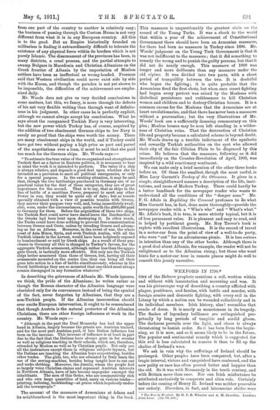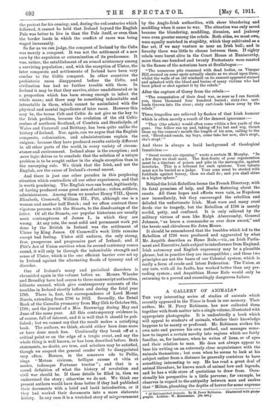WEXFORD IN 1798.* ONE of the Hebrew prophets mentions a
roll, written within and without with lamentation and mourning and woe. It was his picturesque way of describing a country afflicted with plague, pestilence, and famine, with battle and murder, with foreign armies and domestic fighting, with every evil in the Litany by which a nation can be wounded collectively and in its individual members. Irish history, alas ! resembles that oracle of doom. It is nearly as monotonous in its tragedy. The flashes of legendary brilliance are extinguished per- petually by long periods of tangible and sordid gloom. The darkness prevails over the light, and chaos is always threatening to banish order. So it has been from the begin- ning, so it is now, and so it seems likely to be in the future. The popular and sentimental remedy which is suggested for this evil is less calculated to remove it than to fill up the chalice of Ireland's woes.
We ask in vain why the sufferings of Ireland should be prolonged. Other peoples have been conquered, but, after a tragic interval, victors and vanquished have coalesced, and the new polity or race has often proved better and happier than the old. So it was with Normandy in the tenth century, and with Britain more than once. Nor can Irish misfortunes be attributed exclusively to conquests and alien rule. Certainly before the coming of Henry II. Ireland was neither peaceable nor orderly. Disorders, in fact, and internecine strifes were
• The War in Wexford. By H. F. B. Wheeler and A. H. Broadley. London John Lane. 1.122. 6d. net.] the pretext for his coming; and, during the red centuries which followed, it cannot be held that Ireland beyond the English Pale was better to live in than the Pale itself, or even than the border lands in which the conflict of races was being waged incessantly.
So far as we can judge, the conquest of Ireland by the Celts was merely a conquest. It was not the settlement of a new race by the expulsion or extermination of its predecessor. It was, rather, the establishment of an armed aristocracy among a surviving population; and, with the exception of Ulster, the later conquests and settlements of Ireland have been very similar to the Celtic conquest. In other countries the prehistoric races disappeared before the Celts, and civilisation has had no further trouble with them. In Ireland it may be that they survive, either unadulterated or in a proportion which has been strong enough to infect the whole mass ; and there may be something indomitable and intractable in them, which cannot be assimilated with the physical and mental ingredients of later races. However this may be, the terms Celt and Celtic do not give us the key to the Irish problem, because the evolution of the old Celtic realms of northern Scotland, of Cumbria and Strathclyde, of Wales and Cornwall and Brittany, has been quite unlike the history of Ireland. Nor, again, can we argue that the English conquests, colonisation, and administrations explain the enigma; because they have produced results entirely different in all other parts of the world, in every variety. of circum- .stance and environment. Ireland alone is the exception ; and In ere logic drives us to conclude that the solution of a unique problem is to be sought rather in the single exception than in the unvarying rule. We think that the Irish, and not the English, are the cause of Ireland's eternal unrest.
. And there is just one other paradox in this perplexing situation which contradicts all our other experiences, and that .is worth pondering. The English race can boast, legitimately, of having produced some great men of action : rulers, soldiers, administrators. Among them we number Henry VIII., Queen Elizabeth, Cromwell, William III., Pitt, although one is a woman and another half Dutch ; and we often contrast these vigorous persons with the Stuarts, to the disadvantage of the latter. Of all the Stuarts, our popular historians are usually most contemptuous of James I., in which they are wrong. At any rate, the most solid and permanent work yet done by the British in Ireland was the settlement of Ulster by King James. Of Cromwell's work little remains except bad feeling. Ulster still endures, the only strong, free, prosperous and progressive part of Ireland; and if Pitt's Act of Union survives when its second centenary comes , round, it will only be through the indomitable strength and sense of Ulster, which is the one efficient barrier ever set up in Ireland against the alternating floods of tyranny and of disorder.
One of Ireland's many and periodical disorders is chronicled again in the volume before us. Messrs. Wheeler and Broadley have had access to three manuscript authorities, hitherto unused, which give contemporary accounts of the troubles in Ireland shortly before and during the fatal year 1798. There is, first, the correspondence of Lord Mount Norris, extending from 1796 to 1813. Secondly, the Detail Book of the Camolin yeomanry from May 25th to October 9th, • 1798; and the journal of a Mrs. Brownrigg during May and June of the same year. All this contemporary evidence is, of course, full of interest, and it is well that it should be pub- lished; but we cannot say that the result makes a satisfying book. The authors, we think, should either have done more or have done much less. Continually they break off at a , critical point or on the edge of a tragic event, and say the whole thing is well known, or has been described before. Both statements, no doubt, are true, and scholars may be satisfied, though we suspect the general reader will be disappointed very often. Horace, in the sonorous ode to Pollio, sings " Motum civicam, bellique causes et vitia et modos, ludumque Fortunae tractas " ; and that is a sound definition of what the history of revolution and civil war should be. If these details be filled in, then we understand the story ; otherwise we do not. We think our present authors would have done better if they had published their documents with a brief and lucid introduction, or if they had worked their documents into a more elaborate history. In any case it is a wretched story of misgovernment
by the Anglo-Irish authorities, with sheer blundering and muddling when it came to war. The situation was only saved because the blundering, muddling, disunion, and jealousy were even greater among the rebels. Both sides, we must own, were equally matched in stupidity, which they cultivated as a fine art, if we may venture so near an Irish bull; and in ferocity there was little to choose between them. If eighty rebels were burnt alive in the Court House at Enniscorthy, more than one hundred and twenty Protestants were roasted in the flames of the notorious barn at Scullabogue :— " The numerous pits crammed with dead bodies, on Vinegar Hill, seemed on some spots actually elastic as we stood upon them ; whilst the walls of an old windmill on its summit appeared stained and splashed with the blood and brains of many victims who had been piked or shot against it by the rebels."
After the capture of Gorey from the rebels :—
"The computation of their dead was, as near as I can furnish you, three thousand four hundred buried ; sixty-two cart- loads thrown into the river ; sixty cart-loads taken away by the rebels."
These tragedies are relieved by flashes of that Irish humour which is often merely a result of the densest ignorance :—
" They (the rebels) would often come within a few yards of the guns. One fellow ran up and, taking off his hat and wig, thrust them up the cannon's mouth the length of his arm, calling to the rest, Blood-and-ounds, my boys, come take her now, she's stopt, she's stopt'" And there is always a lurid background of theological fanaticism :— " Great events are ripening," wrote a certain M. Murphy. "In a few days we shall meet. The first-fruits of your regeneration must be a tincture of poison and pike in the metropolis, against hereticks. This is a tribunal for such opinions. Your talents must not be buried as a judge. Your sons must be steeled with fortitude against heresy, then we shall do ; and you shall shine in a higher sphere."
Behind the Irish Rebellion looms the French Directory, with its fatal promises of help, and Hoche fluttering about the coasts. All these hopes and efforts were vain, as Napoleon saw immediately, but they encouraged the rebellion and deluded the unfortunate Irish. Most wars and many cruel deeds rise to tragedy, but the Rebellion of 1798 is merely sordid, petty, and confused. It is only relieved by the military virtues of men like Ralph Abercromby, General Johnson, " as brave a commander as ever drew sword," and the heroic and chivalrous Sir John Moore.
It should be remembered that the troubles which led to the Rebellion of 1798 were produced and aggravated by what Mr. Asquith describes as Home Rule,—viz., an Irish Parlia- ment and Executive, both subject to interference from England. Irish autonomy and English supremacy may be a plausible phrase, but in practice they are incompatibles ; and these two principles are not the bases of our Colonial system, which is really a form of crude and latent Federation. The Union, at any rate, with all its faults, has worked better than any pre- ceding system ; and Asquithian Home Rule would only be returning to a proved and exceedingly dangerous failure.











































 Previous page
Previous page